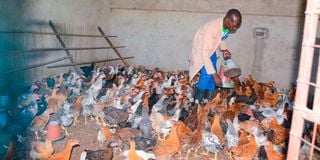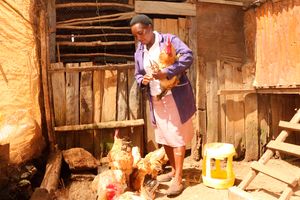
Victor Ouma attends to his chicken at his Chak Achaka Poultry Farm in Kendu Bay.
Nestled in the heart of Kendu Bay, Homa Bay County, is a venture that has become a Mecca of knowledge, hope and inspiration for poultry farmers.
What started as a modest venture in 2018 has morphed into an empire, a one-stop-shop that has grown to Chak Achaka Poultry Farm.
Chak Achaka, which translates to “just start” in the local language, is a phrase used to encourage people to engage in whatever endeavour they are thinking of, even with limited resources.
The place has become a lifeline for farmers, offering a range of services including hatching, brooding, feed formulation and ornamental bird production.
At the centre of this venture on the shores of Lake Victoria is Victor Ouma, 33. Ouma has revolutionised poultry farming in a region known for fishing.
Ouma says the journey to a successful poultry venture was not easy. It is a testament to the power of hard work, resilience and innovation.
Like many, Ouma once dreamt of securing a white-collar job. Failing to get employed, he chose a different path.
With determination and some savings, Ouma bought 500 day-old chicks to start a poultry farm. Three months later, his efforts paid off when he sold the birds. Motivated, Ouma scaled up the operation, increasing his stock to 1,500 birds and expanding his market beyond Kendu Bay.
“On realising that I could not meet the growing demand for chickens and eggs, I saw other opportunities,” Ouma says.
He invested in incubators, enabling him to hatch eggs for locals and meet the rising demand for chicks.
With the current capacity to hatch up to 8,050 chicks at any given time, Ouma’s farm has become a game-changer, generating revenue while strengthening Chak Achaka’s reputation.
For every chicken chick hatched, Ouma charges Sh25 and Sh30 for guinea fowls and other birds. A day-old chick at the farm sells for Sh100.Ouma vaccinates the birds he sells at an additional fee.
Beyond commercial poultry, Ouma targeted the ornamental birds market niche. It has added a layer to his portfolio.
The farm boasts of exotic birds like the Egyptian goose and Polish, Silkie and Bantam chickens, which fetch premium prices for a pair. Their eggs too command a high value, with one going for Sh250 to Sh400.
“Customers want ornamental birds for aesthetic purposes,” says the public health graduate.
With feed accounting for up to 70 per cent of production costs, Ouma developed solutions to cut expenses while maintaining quality.
He introduced hydroponic fodder, a nutrient-rich feed made from barley and other grains.
“The feed make the birds mature fast and produce high quality eggs. The chickens have good weight,” Ouma says.
To produce hydroponic fodder, he soaks the seeds for hours. The seeds are then removed and put in perforated containers. They are then spread on trays to trigger germination.
The sprout that forms a thick carpet with green foliage in five to six days is then disintegrated and given to poultry.
Additionally, Ouma grows azolla – a protein-rich aquatic plant, which is cultivated in shallow ponds using cow dung as manure.
Sun-dried azolla is ideal for improved kienyeji chickens. The pond water and the mixture of azolla can be used as manure after the sixth harvest.
With the readily available chicken droppings, Chak Achaka Farm has a kitchen garden where sukuma wiki, ginger, garlic and aloe vera are grown to serve the dual purpose nourishing the flock and providing natural remedies for common poultry diseases.
Ouma occasionally mixes drinking water with a concoction of ginger, aloe vera and garlic. He says the mixture is a mild antibiotic.
With 12 employees, Ouma manages the daily operations of the farm, ensuring every aspect – from incubation to sale – runs smoothly.
He has also mentored more than 460 young people from across the country. He helps those he mentors get market linkages.
For Ouma, poultry farming is not just about hard work, it is about creativity and identifying what the market yearns for.
“If you remain open to new ideas, the sky is the limit,” the poultry farmer advises.









